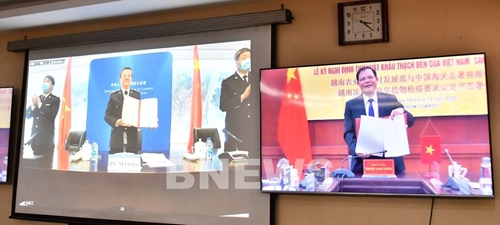Minister Nguyen Xuan Cuong hailed Minister Ni Yuefeng for helping accelerate the signing of the protocol and offering technical directions for appraising Vietnam’s swallow’s nests either online or via video.
He also hoped that China would soon open up the market to Vietnam’s durian and sweet potato and that both sides could sign a protocol in that regard.
    |
 |
|
At the event. Photo: Bnews |
In the context of the COVID-19 pandemic, Minister Cuong suggested the General Administration of Customs of China conduct virtual or video inspections for those two products like in the case of swallow’s nests to boost two-way trade.
Vietnam has also completed dossiers for pomelo and passion fruits, Cuong said, urging the Chinese side to also give priority to granting licences for those fruits.
For husbandry products, first of all swallow’s nests, the minister asked the Chinese side to speed up procedures so that the two sides can early sign protocols and reach consensus on the form of quarantine certificates and the granting of codes to qualified Vietnamese exporters.
Minister Cuong noted that regarding dairy products, Chinese authorities have granted licences to five Vietnamese factories to export to China. He took the occasion to call on China to license more plants to export to China among the 11 Vietnamese plants meeting requirements of the Chinese market.
China has allowed 750 seafood processors, seven crab and lobster packaging establishments and 69 aquatic breeding facilities of Vietnam to export to China. It also accepts shipments of 128 kinds of aquatic products and 48 aquatic species from Vietnam.
Minister Cuong suggested China consider allowing 54 more seafood processors and five more crab and lobster packaging establishments of Vietnam to ship their products to China, and accept an additional five aquatic products from Vietnam.
Technical units should work closely to reach consensus on the criteria for epidemic control and the use of antiseptic, additives, and preservatives in aquatic products traded between the two countries, he proposed.
Ni, for his part, said the two sides have gained positive outcomes in evaluating Vietnam's durian and sweet potato, with only on-the-spot inspection left as China cannot send experts to Vietnam due to COVID-19.
He added that China has informed Vietnam about a risk review of its pomelo and passion fruit and hoped that Vietnam would provide feedback shortly.
China has also completed a risk review on Vietnam’s swallow’s nests, he said, adding that both sides can continue discussing the technical criteria for promoting export of this product to China and that several Vietnamese dairy and seafood exporters will be licensed in the near future.
Regarding the Regional Comprehensive Economic Partnership (RCEP), both sides agreed that the deal will facilitate strong development of bilateral economic and trade ties in the time to come, thus contributing to the two economies.
They agreed to set up a hotline to promptly deal with trade obstacles, intensify the fight against smuggling, and tighten animal quarantine and quarantine capacity.
In reply to China's offer of its hybrid rice varieties, Minister Cuong said that Vietnam will create favourable conditions for the cultivation of those rice varieties in Vietnam.
Vietnam is now China’s seventh-largest trade partner globally and the biggest in ASEAN. The two countries have signed 13 documents to boost bilateral trade in farm produce.
During 2010-2019, two-way trade in agro-forestry-fisheries grew 15 percent annually, reaching 15.7 billion USD in 2019. The figure hit 11.2 billion USD over the last 10 months, 8.3 billion USD of which were exports from Vietnam.
Source: VNA